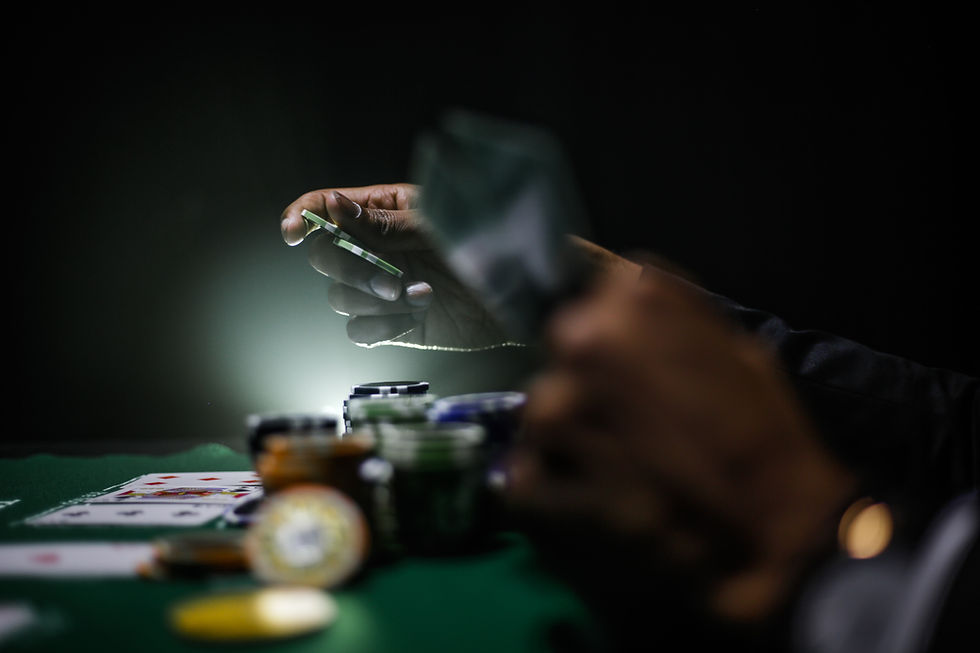What Is Dopamine Gambling—and Why Is It So Addictive?
- Filip
- Jul 3, 2025
- 3 min read
It starts small: a few taps on your phone, a “just for fun” sports bet, a spin on a slot machine. Then it hits—the rush. Not from winning, necessarily, but from the feeling. That quick dopamine spike. The click, the spin, the maybe-next-time pull.

This is what experts call dopamine gambling—a behavioral loop where the high isn’t about money, but about brain chemistry. And it’s exactly what makes gambling so addictive, even for people who never thought they had an issue.
Whether you’re starting to question your own patterns, or you’re watching someone else spiral, understanding the science is the first step to breaking the cycle.
Dopamine: The Brain’s “More” Button
Dopamine isn’t about pleasure—it’s about anticipation. It’s what makes you crave, chase, repeat.
In gambling, every near-miss, free spin, or sudden win triggers a dopamine release. But even more addictive than the payoff? The maybe. The uncertainty. The “just one more” that hijacks the brain’s reward system.
This is why gambling addiction often doesn’t look like someone losing big—it looks like someone chasing the feeling, even if they’re winning.
Signs You're Stuck in the Dopamine Loop
Compulsive gambling isn’t just about losing money—it’s about losing control. Here’s what to watch for:
You gamble to feel something, not win something.
You chase losses, believing the next hit will fix everything.
You lie to others—or yourself—about how much you’re playing.
You feel restless, anxious, or empty when you stop.
You gamble even when it impacts your relationships, work, or health.
It’s not about willpower. It’s about chemistry—and how systems (apps, casinos, ads) are designed to keep you in the loop.
Digital Design Meets Addiction Psychology
Modern gambling doesn’t require a casino. It lives in your phone, built into apps with sleek UX, infinite scroll, and micro-rewards.
From “loot boxes” in gaming to betting apps with push notifications, platforms are engineered to reward impulsive behavior. That’s not coincidence—it’s behavioral design based on what triggers dopamine.
“It’s not about big wins,” says Dr. Lena Sjöberg, a behavioral psychologist. “It’s about intermittent rewards. The brain keeps coming back for uncertainty—because certainty gets boring.”
How to Break the Cycle (Without Shame)
Stopping dopamine gambling isn’t just about quitting cold turkey. It’s about replacing the loop with something more stable—and less hijacking.
1. Identify Your Triggers
Are you gambling out of boredom, loneliness, stress? Keep a log for a week—what’s happening when the urge hits?
2. Interrupt the Pattern
Add friction. Delete the app. Block access. Set a “cool-off” timer. Even a few seconds of pause can short-circuit the impulse.
3. Seek Dopamine Elsewhere
Exercise, novelty, deep focus—these can all create dopamine spikes without the crash. It’s not about cutting pleasure, it’s about changing how you access it.
4. Talk to Someone (That Isn’t a Bookie)
You don’t have to hit rock bottom to need help. Therapy, peer groups, or digital support programs can help you reroute the habit before it becomes destructive.
If You’re Trying to Help Someone Else
Don’t start with judgment. Start with curiosity. Ask what they get from the behavior—not just what it costs them.
Recognize: gambling addiction isn’t a moral failure. It’s a neurological loop built into systems that profit off keeping people stuck. Empathy doesn’t enable—it disarms shame, which is often the very thing keeping the cycle going.
Why This Matters Now
Online gambling has exploded in accessibility and social normalcy. What used to require effort is now a background app—and for many, the line between entertainment and compulsion is blurred beyond recognition.
But here’s the good news: the brain can rewire. The dopamine loop can be interrupted. And recovery doesn’t mean losing all excitement—it just means reclaiming control over where you find it.





